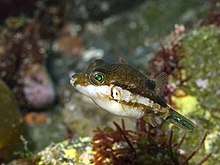Canthigaster rivulata
Canthigaster rivulata commonly known as the Brown-lined puffer, or kitamakura (Japanese: キタマクラ) is a marine fish belonging to the family Tetradontidae.
| Brown-lined Puffer | |
|---|---|
 | |
| Scientific classification | |
| Kingdom: | |
| Phylum: | |
| Class: | |
| Order: | |
| Family: | |
| Genus: | |
| Species: | C. rivulata |
| Binomial name | |
| Canthigaster rivulata | |
Description
Canthigaster rivulata is a fish which grows up to 15–20 cm length. Its body has 2 longitudinal dark bands that join in front of the gill slit, lower band that is either faint or absent, small dark spots in the ventral area, caudal fin with dark stripes and a dark blotch at the caudal base.[1]
Distribution and Habitat
This species are found in tropical waters of Indo-Pacific. It can be seen in the waters from East Africa south to Natal, South Africa and east to Hawaii, north to southern Japan and south to north western Australia.[2][3]
They are usually near rocky and coral reefs that are 100 metres deep however they are also found around shore lines that are around 30 metres deep.[4]
Diet
Canthigaster rivulata is omnivorous and preys mainly on algae, echinoderms and molluscs.[5]
Behaviour and Breeding
This pufferfish is a solitary animal. Its breeding season is in Summer and during this time, the male presents its breeding colour which shows vibrant blue patterns around its body.[6]
Poison
The fish has the poison, tetrodotoxin, resided in the intestine, liver but mostly in the skin and the mucus generated by it, however it is not present in the muscle or the ovary like most other Pufferfish. Its mucus has high risk of contamination of the toxin to other fish or human due to direct contact with the skin.[7][8]
References
- "Canthigaster rivulata summary page". FishBase. Retrieved 2019-08-11.
- "Canthigaster rivulata summary page". FishBase. Retrieved 2019-08-11.
- "The IUCN Red List of Threatened Species". IUCN Red List of Threatened Species. Retrieved 2019-08-11.
- "キタマクラの特徴 | 釣魚図鑑(特徴・仕掛け・さばき方) | Honda釣り倶楽部". Honda公式ホームページ (in Japanese). Retrieved 2019-08-11.
- "キタマクラ | WEB魚図鑑". ズカンドットコム (in Japanese). Retrieved 2019-08-11.
- "キタマクラ | WEB魚図鑑". ズカンドットコム (in Japanese). Retrieved 2019-08-11.
- "キタマクラ | 魚類 | 市場魚貝類図鑑". ぼうずコンニャクの市場魚貝類図鑑 (in Japanese). Retrieved 2019-08-11.
- "キタマクラの名前の由来とは?生態や毒の危険性、特徴をご紹介! | 暮らし~の[クラシーノ]". kurashi-no.jp (in Japanese). Retrieved 2019-08-11.